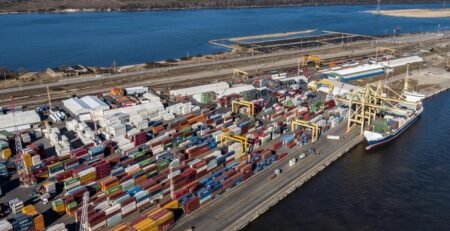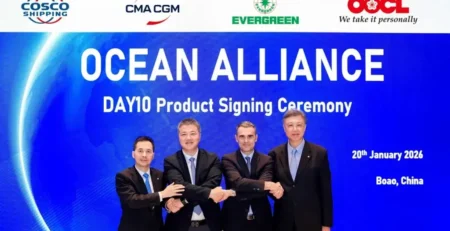Burnsed Trucking Responds to U.S. Tariffs with Strategic Cold Chain Expansion to Safeguard Seafood Logistics

By Eva Richardson | The Logistic News
April 9, 2025
As the latest wave of U.S. tariffs reshapes trade flows in the seafood sector, Florida-based Burnsed Trucking is taking decisive action. The cold-chain logistics firm, headquartered in Ft. Pierce, has unveiled a comprehensive strategy to support seafood importers and distributors navigating the new economic reality.
Strengthening Cold Chain Capabilities
Burnsed Trucking, renowned for its specialization in LTL (less-than-truckload) and FTL (full-truckload) seafood transportation, is responding to the shifting landscape with a dual strategy: bolstering its refrigerated fleet and optimizing route flexibility to accommodate volatile market dynamics.
“Our vision is clear: we’re building a national cold-chain infrastructure that gives seafood suppliers the confidence to grow their U.S. footprint, even in uncertain times,” said CEO Fred Baedorf. “What we’re seeing isn’t just a tariff—it’s a long-term reset of how seafood moves across borders.”
Tactical Expansion for Resilience
The company has invested in a series of late-model refrigerated box trucks, expanding its fleet capacity and reliability. This move is designed to ensure the timely and temperature-controlled transport of perishable goods, even as port schedules and distribution windows become increasingly erratic.
Paul Pointer, General Manager of Burnsed Trucking, highlighted the adaptability of the company’s LTL framework, which enables fast turnarounds, especially for regional distributors. “With our night dispatch service and growing network, we’re providing agility and scale when our partners need it most,” he noted.
Leveraging Backhaul and Cross-Docking Efficiency
To further enhance operational efficiency, Burnsed is pursuing new opportunities in backhaul freight, capitalizing on return trips to maximize capacity use. The company is also enhancing its cross-docking capabilities, helping seafood importers reduce storage costs and maintain product freshness.
Customer-Centric Innovation
Chief Revenue Officer Greg Banks underlined that the company’s response is rooted in its long-standing commitment to reliability and partnership. “These market shifts are real—but so is our determination to turn disruption into opportunity. We’re investing in scalable, smart solutions that prioritize our customers’ needs for safety, speed, and consistency,” Banks said.
Conclusion: Adapting with Agility
Burnsed Trucking’s proactive approach to tariff-related disruptions showcases how niche logistics providers can lead through innovation and resilience. By doubling down on cold-chain capacity and flexible delivery models, the company is not only protecting its current customer base but also positioning itself as a future-ready player in a complex global supply chain.
For more insights into cold chain innovation, trade policy impacts, and seafood logistics trends, follow Eva Richardson and The Logistic News on LinkedIn and Google News.
The post Burnsed Trucking Responds to U.S. Tariffs with Strategic Cold Chain Expansion to Safeguard Seafood Logistics appeared first on The Logistic News.
Share this post
Related
Posts
The United States seizes a 7th tanker: pressure mounts on sanctioned ships
New episode in the maritime tug-of-war over sanctions: the United States has seized a seventh tanker suspected of operating in...
China replaces US barrels with Canada: new impact on tanker routes
The geography of oil is shifting, and shipping feels it immediately. According to analyzes reported by BIMCO, Chinese crude oil...
The Port of Klaipėda Signs a Record Year Driven by Containers, LNG, and Ro-Ro
The Lithuanian port of Klaipėda announces a historic performance in 2025: 39 million tons handled, despite a tense geopolitical context...
Ocean Alliance maintains the detour via the Cape, while preparing a “Suez plan”
The Ocean Alliance (CMA CGM, COSCO Shipping, Evergreen, and OOCL) has just unveiled its “Day 10” East-West network, which will...




